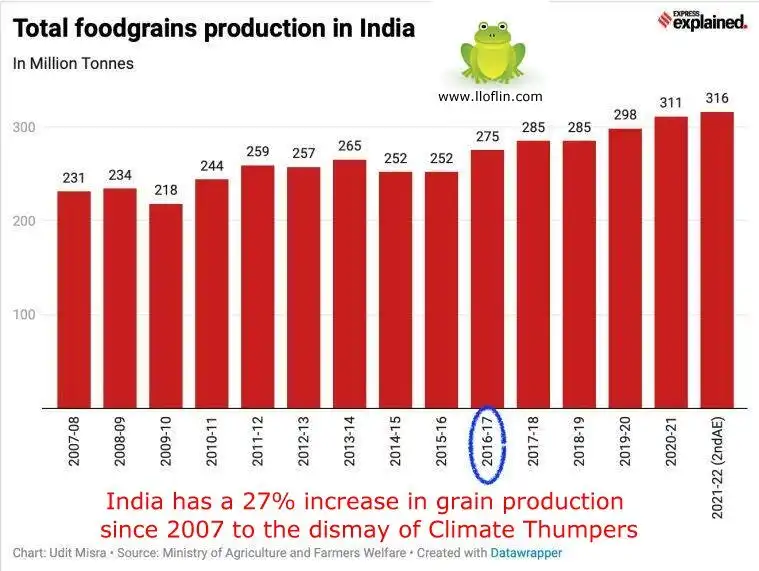Overview
Since the 1970s, climate activists have predicted mass starvation due to pollution and climate change, yet global grain production has soared. From Bristol, Virginia, my deist perspective emphasizes reason over alarmism, highlighting how technology, warmer climates, and CO2 fertilization have driven agricultural success. Updated to 2025, this page examines record cereal, wheat, corn, and rice yields, challenging failed predictions and advocating for evidence-based policies, free from progressive bias.
Record Grain Production
Global cereal production in 2023–24 reached 2.836 billion tonnes, up 1.2% from 2022–23, with 2024–25 projected at 2.854 billion tonnes. Wheat production was 788.5 million tonnes in 2023–24, with 796 million forecast for 2024–25. Corn hit 1.221 billion tonnes in 2023–24, up 5.5%, and rice reached 514.6 million tonnes. Top wheat producers include the EU (134.6M), China (136.9M), and India (109.6M), with the U.S. fifth (44.8M). These gains, driven by technology and climate factors, contradict starvation forecasts.
CO2 and Greening Benefits
NASA reports global greening covering twice the U.S. continental area, driven by CO2 fertilization (422.5 ppm, 2024) and slight warming. Higher CO2 levels boost plant growth, enhancing yields, as seen in U.S. corn (389 million tonnes, 2024). Malthusian predictions, like those from the 1970s, ignored these benefits, focusing on fear rather than adaptation. This greening, visible in India and China, underscores nature’s resilience, challenging alarmist models.
Share This Article
Conclusion
Record grain production in 2025 debunks decades of climate activists’ starvation predictions. Technology, CO2 fertilization, and adaptation have outpaced alarmist models, ensuring food security. From Bristol, I advocate for reason-based policies, rejecting fear-driven narratives that distort science. By embracing innovation, we can sustain prosperity, free from the science-industrial complex’s hype.
References
Data and sources are available on related pages, including FAO, USDA, NASA, and Statista reports linked within the content.
| Crop | 2023–24 Production (Million Tonnes) | 2024–25 Forecast (Million Tonnes) |
|---|---|---|
| Cereal | 2,836 | 2,854 |
| Wheat | 788.5 | 796 |
| Corn | 1,221 | 1,235 |
| Rice | 514.6 | 520 |

- Infiltration by Progressive ideology:
- Resources: Challenging Elite Narratives (Read first.)
- Socialism and Communism: Unmasking the Shared Ideology - BristolBlog.com
- The Progressive Bias in Science: Why Trust Is Eroding - BristolBlog.com
- Peer Review Problems: Is Science Truly Objective? - BristolBlog.com
- Climate Change Funding: A Science-Industrial Complex? - BristolBlog.com
- NASA’s Climate Science: Ideology Over Evidence? - BristolBlog.com
- Environmentalism’s Anti-Human Bias: A Threat to Progress - BristolBlog.com
- Models Overhype Sea Level Rise - BristolBlog.com
- Global Grain Surge Challenges Climate Predictions: 2025 Update - BristolBlog.com
- Tibet Tree Rings Reveal Natural Climate Cycles - BristolBlog.com
- Climate Models Miss the Mark: U.S. Thrives Despite Alarmism - BristolBlog.com
- Are Climate Policies About the Environment or Money? - Bristol Blog
- Earth Science Insights: Historical Climate Change Over Geological Time | Bristol Blog
- How CO2 and Climate Shape Plants: C3, C4, and Greening - Bristol Blog
- Tuvalu Atolls Debunk Sea Level Hype - BristolBlog.com
- Other:
- Unmasking Fake News: How Media Fuels Violence and Immigration Fear
- Black-on-Black Crime Ignored by Press: Chicago’s Slaughterhouse | Bristolblog
- Crime Surge and Pub Closures: London’s Multicultural Collapse | Bristolblog
- Middle East Chaos: Overpopulation and Religious Violence, Not Climate | Bristolblog
- Islam vs. West: Press Bias Fuels Muslim Violence and Silences Reformers | Bristolblog
- Democrat Identity Politics Fuels Muslim Religious Violence | Bristolblog
- Turkish Alevism: A Distinct Faith, Not Islam | Bristolblog
- Immigration Challenges in East Tennessee: A 2025 Update - BristolBlog.com
- Marijuana’s Risks: Addiction, Mental Health, and Crime in Bristol, Virginia - 2025 Update
Media bias and closed discussions:
